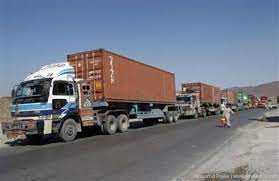KABUL (Khaama Press): The World Bank says Afghanistan’s exports dropped 5% to $140.5 million from last January.
According to this World Bank report, recently published under the title “Afghanistan Economic Update,” the country’s exports were $148.1 million in January of the previous year.
However, the World Bank report states that Afghanistan’s imports have increased by 37% compared to January last year, rising from $600 million in January of the previous year to $830 million in January 2024, thereby increasing the trade deficit.
The World Bank has estimated Afghanistan’s annual imports at a total of $5.5 billion, which, according to the bank, indicates a trade deficit of $3.5 billion.
The World Bank says Afghanistan faces an economic recession due to reduced economic activity and ongoing inflation.
In its report, the bank stated that the annual inflation rate in the country reached -10.2% in January of this year.
The report from the World Bank indicates that this inflation resulted from a sudden decrease in the price of food items
(-15.1%) and non-food items (-4.8%).
The World Bank added that while the decrease in the price of goods might provide short-term relief for financially vulnerable families, according to the bank, this situation could lead to significant economic damage.
The World Bank report states that long-term inflation could delay consumer purchases, reduce merchants’ investments, and halt economic growth.
The bank further reminded in its report that the value of the Afghan currency had been maintained against foreign currencies over the past 18 months but had depreciated in January this year, including against the dollar and most other foreign currencies.
The World Bank also added that revenue collection in Afghanistan was also 2% less than the set target, totaling 189 billion Afghanis in the fiscal eleven months (March 2023 – February 2024).
The interim government of Afghanistan has not yet reacted to this World Bank report, but economic sector officials always consider maintaining the value of the Afghan currency against foreign currencies and collecting revenues as among their achievements.
However, Afghanistan is facing a dire humanitarian crisis. The country’s healthcare system is on the brink of collapse, with a significant shortage of medical supplies and healthcare professionals.
Hospitals and clinics across the country are struggling to provide basic services to the population, exacerbating the health crisis exacerbated by malnutrition and the spread of infectious diseases. The lack of international funding and sanctions has further strained the healthcare infrastructure, leaving millions without access to essential health services.
Moreover, the situation has led to an alarming level of food insecurity, with millions of Afghans at risk of hunger and malnutrition.
The agricultural sector, a cornerstone of the Afghan economy, has been severely impacted by droughts and the lack of access to farming supplies and markets.
This crisis is compounded by the displacement of populations due to ongoing conflict and natural disasters, making it challenging to deliver humanitarian aid to those in need. The international community’s response has been hindered by political complexities, leaving a significant gap in the provision of necessary aid to address the urgent humanitarian needs of the Afghan population.







